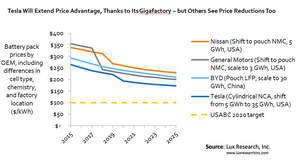BOSTON, MA--(Marketwired - May 19, 2015) - The electric vehicle opportunity is set to expand, as leading battery developers like Panasonic drive down prices of lithium-ion (Li-ion) battery packs by 35% to $172/kWh in 2025, according to Lux Research. However, only the best-in-class players will achieve that cost threshold, while others lag at $229/kWh.
The estimate is based on a new bottom-up cost model built by Lux Research in an industry known for being highly secretive about its costs. The model accounts for differences in battery chemistry, form factor, production scale, location and other nuances.
"High battery prices have led to some huge missed opportunities in the electric vehicle market. Now if developers can drive down prices to $200/kWh or less at the pack level, they have a chance of selling millions of EVs by the mid- to late-2020s, and reap great revenues," said Cosmin Laslau, Lux Research Senior Analyst and lead author of the report titled, "Crossing the Line: Li-ion Battery Cost Reduction and Its Effect on Vehicles and Stationary Storage."
Lux Research analysts used primary interviews and research to build out its cost model for Li-ion batteries and evaluate the new opportunities emerging for developers and OEMs. Among their findings:
- Competitive gap is widening. Technological innovation and scale are helping leaders like Panasonic, in partnership with Tesla, widen their competitive advantage. While Panasonic-Tesla and China's BYD will achieve $172/kWh and $211/kWh at the pack levels, respectively, the Nissan-AESC partnership risks falling behind at $261/kWh unless it changes technologies and production strategies.
- Disruptive Li-rich NMC will deliver more gains. In 2025, a disruptive Li-rich NMC would bring in cost gains of $17/kWh over conventional NMC/graphite cells. While scale-up efficiencies like Tesla's "Gigafactory" remain a key strategy, geographical location and technology like high-voltage cathodes are also key factors.
- Some benefits will reach stationary storage market, too. Li-ion cost reduction will positively impact the stationary storage market as well. However, it will not address added costs like the power conditioning system, land, construction and integration. Therefore, installed stationary systems spanning from residential to grid-scale will range from $655/kWh to $498/kWh in 2025, respectively.
The report, titled "Crossing the Line: Li-ion Battery Cost Reduction and Its Effect on Vehicles and Stationary Storage," is part of the Lux Research Energy Storage Intelligence service.
About Lux Research
Lux Research provides strategic advice and ongoing intelligence for emerging technologies. Leaders in business, finance and government rely on us to help them make informed strategic decisions. Through our unique research approach focused on primary research and our extensive global network, we deliver insight, connections and competitive advantage to our clients. Visit www.luxresearchinc.com for more information.
Contact Information:
Contact:
Carole Jacques
Lux Research, Inc.
617-502-5314
carole.jacques@luxresearchinc.com
